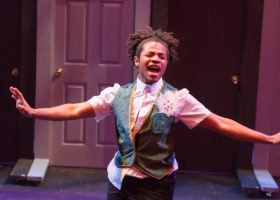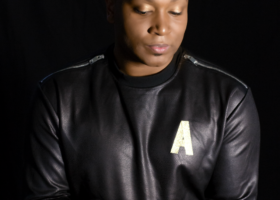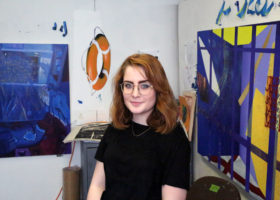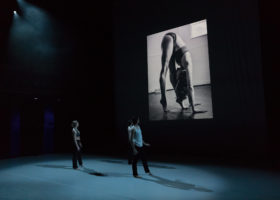As part of The Glassblock’s sponsored partnership with the New Hazlett Theater, we will be presenting a series of editorially-independent previews and reviews of the 2016-2017 Community Supported Art (CSA) Performance Series. Follow along here, and learn more about how you can experience this season’s CSA here.
![]()
On the second floor of the Carnegie Library Homewood branch one recent morning, we met with Dr. Jason Mendez, a professor with a background in urban and social foundation education, cultural studies, and Latino studies, and, FaceTiming from Iowa City, Iowa, where she’s currently a fellow at the celebrated Iowa Writers’ Workshop, Dr. Tameka Cage Conley, a literary artist who works in poetry, fiction, essays, and plays. Though they’ve known each other for less than two years, Drs. Mendez and Conley have formed a close friendship that has turned into artistic collaboration. Accepted into the New Hazlett Theater’s CSA Series, Mendez and Conley are in the final days of preparing Redemption: Sons, a duologue based on shared experience of loss and trauma that in purposeful ways has condensed their relationship and correspondence into what aims to be a confessional, therapeutic performance.
In our discussion in advance of their December 8th debut, we touched on a number of topics, including the themes and stage development of Redemption: Sons, identity and family, and the experience of transitioning from the role of academic to one of an artist-activist. Below is a lightly edited transcript in advance of their December 8th debut.
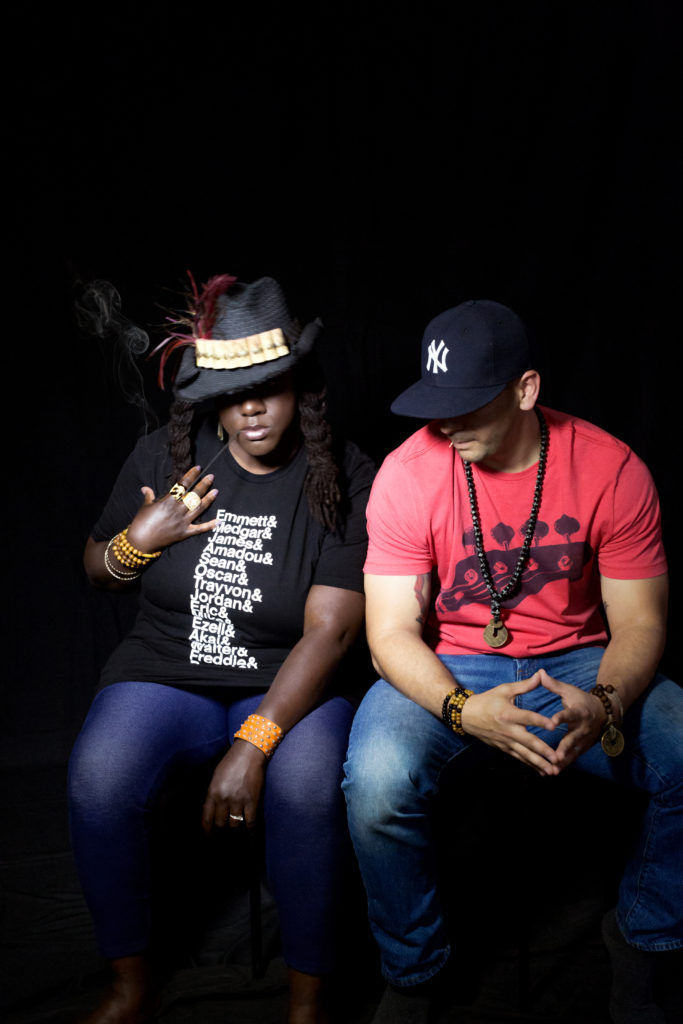
Jason Mendez: This past year I’ve transitioned from academic to artist, after a very traumatizing experience as a visiting professor at Duke, where I experienced issues of racism, microaggressions, [and] traumas regarding me being a Latino professor at an elite white university in the South. I transitioned to this space where I can amplify my voice a little bit more, I felt, than in research articles or publications.
Dr. Conley I met about a year ago when I was a fellow in the Penn Avenue Creative fellowship through the Kelly Strayhorn Theater. She was a facilitator for our workshops, and we just connected right off the bat. We had a retreat—I believe it was in Millersville, Ohio, in Amish Country. She was an academic who transitioned into a literary artist as well, and it was something she encouraged me to do after finding some of my work online. We were both former academics, we were both parents, both married. We were both raising sons of color: my son being an Afro-Taino little boy who’s seven years old; her son Maze is two years old. Our conversations were really about our experiences with race and the traumas we experience, and the fears we project onto our sons as they grow up in a society that will racially profile them as young, little men of color. That is where Redemption: Sons came from.
It really was a project that was centered around our sons, but the more we wrote the script, we realized this was us healing. This was us as parents trying to raise [our sons] out of our own mental illness, our own traumas, with not only experiences that we’ve had in academia or in life as adults, but going back and looking back at our experiences as kids—myself growing up in the South Bronx, Tameka growing up in Shreveport, Louisiana—and looking at issues of race. For me [that was] looking at what it meant to be Puerto Rican in New York and what it means to be Puerto Rican in Pittsburgh, in a space that doesn’t have many Latino [people].
We call this performance a “duologue,” and it’s us laying out our fears, being vulnerable—and it just so happens to be in front of a crowd at the New Hazlett Theater. I think the cool thing about our performance is that it’s still an ongoing process: It’s a script that’s still being redefined even as we speak. I mean, one of the sad facts is there’s been a constant loss of life of Black males, Latino males, because of police violence, [and] it’s added to our script. It never seemed like our script was ending because there was never an end to the violence that black and brown folks were experiencing in society.
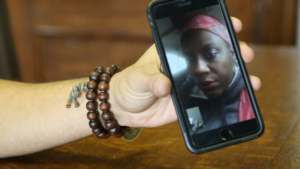
Tameka Cage Conley: I’ve voted since I was 18 years old; it’s a civic duty for me. And I’ve been disappointed before. But in this recent election, I actually broke down in tears. They streamed it at the Dey House here at the Writers’ Workshop, so I was watching it with friends. Once it was clear who the president-elect was going to be, I caved in—for no other reason than because I’m already very anxious and very nervous about raising my African-American son in the United States. When you have, for example, 12-year-old Tamir Rice who was gunned down while playing in a playground—by a police officer who faces no charges today. Tamir was only ten years older than my son.
My son is also extremely tall for his age. He is two-and-a-half-years-old and 3’5”, so people think he’s 4 already. He is already growing into the body type of the Black male that gets profiled, who is considered dangerous. But really what our work has uncovered, and what so many of our conversations have led us to is that there is actually no specific profile—that there’s no perfect way in which to avoid being killed if you’re African-American, or if you’re Latino. So the impetus for our work is absolutely about the saving of life, the saving of biological life, of psychological life, because there is so much suppressed emotional trauma due to racism.
One thing that Dr. Mendez hinted at: He suffered PTSD as a result of what he experienced at Duke. And part of what really drew me to him is the fact that he was able to name that, specify that. I think we, especially in communities of color, don’t talk openly about mental health, and we don’t talk about how issues of racism, classism, [and] homophobia affect mental health on a daily basis, from the microaggressions to the macroaggressions, of living in a culture where fear mongers get to become president. That’s really a big part of what Redemption: Sons is asking in a revised way, even since the election.
Where are we? Why are we normalizing white supremacy? Why are we allowing them to rebrand as the “alt-right”? Why are we allowing white nationalist organizations to hold meetings at public restaurants in the nation’s capital? And why are we not saying what this is? Why are we not saying that this is hate, that this is white supremacy, that this is an attempt to roll back decades of civil rights advancements? That this is an attempt to revoke the rights of African-American people? That this is an attempt to suppress our immigrant communities? All of that is tied into Redemption: Sons, because what we’re saying is, as parents, we should be able to feel free to raise our children just like any other white American and feel like we can let our kids go outside to play without them being profiled.
I mean, it’s already happening. There was an incident at my son’s day care. He’s two years old. He was fussy, we were on a field trip, and he grabbed the shirt of another one of the moms, just because he was tired. So she’s holding her two-year-old kid. He grabs her blouse, and she went to move his hand away before either me or my husband had a chance to do that—and with no engagement with me as his mother. Absolutely inappropriate. So I was thinking, wow, instinctively, she wanted to move his hand—and I felt it was because he was African-American.
We are trying to respond to a number of things in a very short show. We know we can’t address everything, but what we are trying to do is to use our friendship, our intellectual connections, and how forthcoming we’ve been able to be with each other—and the opportunity that the CSA has provided to give us a platform—to create a dialogue. There are so many people in Pittsburgh, across the country, and around the world who do not always get mainstream media coverage: We want to allow people who haven’t had a chance to voice their concerns to be able to do that. So it’s a manifold show for us, with many purposes. Hope for change.
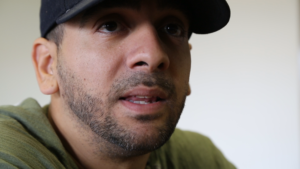
JM: One of the important parts of this show that I’m really invested in is exploring issues of racism when it impacts Latinos and Latino subgroups, especially here in Pittsburgh given that conversations about race at times feel very binary on a black-or-white spectrum. We don’t consider the experiences of Latinos, and Latinos themselves don’t know how to articulate their experiences as well. There’s a line that has been really pushing this part of the script for me. It’s by the poet Lemon Andersen: “I’m a suspicious mulatto, which means I’m too black to be white and too white to be doing it right.” And so you’re in this middle space of, how do I navigate these experiences of race?
The thing that connected Tameka and me off the bat, instantaneously, that built this friendship from colleague to colleague, or artist to emerging artist, or even like a brother-and-sister type of relationship, was really that when I talked to her about my experiences at Duke with issues of racism, I didn’t have to provide evidence that my experiences were real. She knew, as a professor herself, as a Black woman in a predominantly white institution herself, she knew it was real what I had experienced. And that was just an important part for me in terms of healing.
This is the first piece I’ve done in a year since transitioning from an academic to an artist. I’ve done readings and small performances, but this is really a debut for me. … It’s a little nerve-wracking given that we’re being vulnerable with our actual lives—our fears, our mistakes with parenting, and with our own lives, really putting it out there for people to dissect. But for us as former academics who have the experience with engaging with students, we’re hoping this does bridge a dialogue beyond just an artistic performance. We’re really inspired about the December 9th matinee [the afternoon following the December 8th debut] and in engaging high school students in these conversations, high school students who are now entering [a period with] a presidency from Obama into president-elect Trump. What does that mean for their own experiences, especially in a city like Pittsburgh that is highly segregated? What are they experiencing in their own schools?
I have a piece in this performance where I talk about my son who goes to a predominantly white school, his experiences with his race, with being the only student of color in his classes. What does that mean for him, and what does that mean for a parent? [But it also speaks to my] PTSD because it brings back all these experiences I had at Duke. So as much as Redemption: Sons is about the folks who are attending it, it’s really about us and the healing that comes from us.
“We can talk about each other’s stories with a certain amount of freedom and care and sensitivity to the other person. We’re going to take that to the stage.”
Adam Shuck: Can you speak a little about the process, how you individually or collaboratively created this performance?
JM: Redemption: Sons started as an email response back and forth, and I think for some reason I just picked this topic of being a dad raising a Puerto Rican kid in Pittsburgh, and it prompted Tameka to think about raising [her son] Maze in Pittsburgh, and so we went back and forth with these conversations about being a parent.
TC: What ended up happening, as we wrote back and forth, is, once we put the document all together, we realized we had something very unique in terms of a cross-cultural engagement with different experiences of culture, ethnicity, and gender. Jason found this conference at Harvard, the Annual Alumni of Color Conference, and we applied to do a version of Redemption: Sons then, and it was accepted. They were extremely supportive—we got a standing ovation, which made us feel really great. And then, a few days later, we got back to Pittsburgh and got the call from Bill [Rodgers, New Hazlett’s director of programming] that we’d gotten into the CSA.
JM: The challenge for the CSA was, how do we translate this piece that was presented in this reading forum to something that’s theatrical. A good friend of Tameka [whom] she brought on board is actor and director Edwin Lee Gibson, and we also brought on board Christiane Leach Dolores to help with translating this reading piece into an actual theatrical performance. It’s really taken on a different body from what we did at Harvard into something that’s more performative, but at the same time performative of our real life stories. So it’s not these narratives that we created for the sake of theater, but we’re actually using auto-ethnographic pieces of our own experiences.
The show takes us back to the time Tameka and I first met, so it’s really an audience getting to see two people meet for the first time, sharing stories, and building this connection that’s very layered. It’s two parents—one from the Hunts Point section of the South Bronx, [and] Tameka [who] grew up in Shreveport, Louisiana, [with] nuances of gender and class: What does working class mean for me in the South Bronx versus what does working class mean for Tameka in Shreveport? It’s a piece that’s very intersectional and explores all these pieces—not explicitly, but they’re embedded within the script—so there are many different openings for people to engage with this performance. We’re hoping that translates well, but we’re confident. Edwin Lee Gibson, our director, has done a phenomenal job in terms of weaving this script into this duologue piece rather than just being separate stories that are performed parallel to each other.
TC: I think another aspect is that Jason and I have had so many conversations that are real and honest about our lives and about painful things that usually would take friends maybe years or decades to get to that level of transparency that we got to in two or three days at that retreat. We can talk about each other’s stories with a certain amount of freedom and care and sensitivity to the other person. We’re going to take that to the stage.
[Another layer of Redemption: Sons] is about loss. For Tameka, it’s her experience with miscarriages before Maze was born. For me, it’s about the loss for my father, who died from brain cancer the same year that my son was born. I’m getting emotional because today is the day he passed in 2009. For me, it’s dealing with that balance of loss and life. That’s why—I don’t want to say we’re overly protective—but our sons fill this void for us in a way that others may resonate with.
I think that’s where the notion of redemption comes from: From this idea of saving them. But saving them from what? We can name this as systemic white supremacy, but how does that manifest into these experiences we have on a daily basis? We’re talking about police violence and racial profiling, but we’re also talking about the racial profiling and violence that happens in our schools for our sons. That same ideology is embodied in other folks and other spaces, whether in a mall, a school, or a convenience store.
AS: Redemption: Sons is an act of healing for yourselves. How much are you thinking about how the audience is receiving it? What do you want the audience to come away with?
JM: That’s an interesting question that Edwin asked us when we were thinking about the script in its totality. I think about what connected me to Tameka is that I needed someone to help me navigate through these crossroads. What she taught me is that there’s a difference between healing and recovery, and she was asking me where I was—and I was at neither. I didn’t know what that meant. Tameka pushed me to go into this more artistic arena that allowed me to put what I was feeling [out] and not have to worry about theoretical frameworks, methodology, review of literatures, [the] publish-or-perish type of atmosphere—but just to let it be, let it live.
I did a reading this past Friday where I did a small section of the script, and two people came up to me afterwards. One Mexican gentleman who runs a food company here in Pittsburgh connected with the experience of having to always define who you are. Being in this brown body, it’s this ambiguous identity: “Well, are you Italian? Are you Muslim? Are you this or that?”—these constant microagressions of always having to tell you who I am. He connected with that point, and we had a great conversation.
I spoke with another woman who had a son but also lost her father. She broke down afterwards. She didn’t connect with the identity [so much as] she was drawn to the [theme of] the loss of a father.
So there are multiple layers that I think provide multiple opportunities for people to relate to. We hope it’s a time of healing but also a time of helping folks move forward in terms of their own stories.
TC: Because Jason and I are constantly engaging with work that has social justice at its center, this really is part of our praxis anyway. It was who we were as academics and who we are as artist-activists as well. So engaging communities is naturally part of our work. We both probably combined have about 20-25 years of teaching experience between us. That plays a role in terms of us thinking about how to prepare for the matinee and thinking about the students and being more dynamic than maybe a typical classroom experience or even a typical artistic experience. We really want to take people into the depths of their own experience, because that’s what the best art does. I don’t know if any of you in the room have had a chance to see Moonlight, but if you haven’t, I would rush to get to it, because it’s really powerful. Beyond powerful—it’s unbelievably imaginative, and it does that work of not just showing you these characters on the screen but giving you license to look inside yourself. That’s what I hope Redemption: Sons will be able to do as well.
“One of the things that I do at the beginning of my classes is ask my students, ‘Who did you bring with you today?’ … We always bring a collection of folks with us.”
AS: To that point, Dr. Conley, in addition to Moonlight, are there other pieces of art that have influenced you in the creation of this?
TC: I don’t think there’s anything that directly does what we’re doing in quite the same way. If you think about this concept of creating something that our children will be able to look back on once they’re older, Ta-Nehisi Coates’s Between the World and Me does that. I’m engaging with great literature all the time. I think we wanted to bring the openness of the August Wilson play where you can just find the balance between comedy and tragedy and drama on the same stage. We were also inspired by music as well, which I think Jason could talk more about—because, a lot of people don’t know this, but he’s a former DJ.
JM: [Laughs] No, no!
I think being a former DJ, not a practicing DJ anymore, really influenced how I write. Like music, I take different writers and I combine them in my pieces to create a new, harmonious text. For example, I reference Willie Perdomo; I reference Lemon Andersen; I reference Flaco Navaja; I reference the Ghetto Brothers, the Young Lords, Tito Puente—as a way to combine all of these folks into one space to show what influenced my own work.
One of the things that I do at the beginning of my classes is ask my students, “Who did you bring with you today?” They always get confused by that question, and I explain, we always carry people with us, whether it’s a mom, a dad, a sister, a brother, a grandparent, a cousin, a friend, an artist. We always bring a collection of folks with us.
If I do DJ anymore, it’s in my car with my kids, and I’m able to teach them things through the music that I listen to. They get a history lesson on Puerto Rico, because we’re listening to Héctor Lavoe, Marc Anthony, Willie Colón. They’re getting a history lesson on the South Bronx because we’re listening to Camp Lo, we’re listening to Nice & Smooth, were listening to the Ghetto Brothers. Music for me is able to engage in a different kind of language. We incorporate that in the piece. We have sections where there are music clips because I want you to feel what I listened to that helped me get through certain times. And not just for people to listen to what I listen to, but for people to think about the music that inspires them, their own identities, their own sociocultural histories, and to really embrace that.
![]()
Toward the end of our conversation, Dr. Conley told us that Redemption: Sons is “going to reflect not just the bond that [Dr. Mendez and I] have, but what’s possible when people just sit down and have an opportunity to communicate.” Your opportunity is on December 8, 2016, when Redemption: Sons will debut at the New Hazlett Theater. Buy your share of the CSA here and get admission to the entire season of performances.
